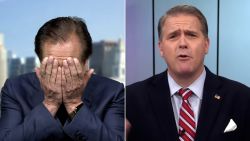The Russia investigation has been a frequent target of President Donald Trump’s ire over the past 18 months, though he hadn’t tweeted about it much recently. The words “Witch Hunt” appeared only once in his Twitter feed in the month of October, as Trump instead focused on the midterm elections.
That ended Thursday morning, when the President sent a series of tweets lashing out against special counsel Robert Mueller and the Russia probe. The tweets came as Trump has spent much of the past week meeting with his lawyers, as CNN has reported, reviewing written questions about Russian collusion that were submitted by Mueller and his team.
On Thursday, the President resurrected several of his favorite lines of attack that, while potent with his political base, aren’t grounded in evidence or facts. As speculation swirls over Mueller’s next moves, following a period of silence in the weeks leading up to the midterms, it’s worth fact-checking the President’s claims. Here’s a breakdown of some of the inaccuracies.
Fact-check of “inner workings”
There haven’t been any recent news articles detailing supposed dysfunction on Mueller’s team. It’s not clear how Trump would hear about the “inner workings” of the investigation. After this tweet, some of Trump’s critics speculated that he might have learned new details from acting Attorney General Matthew Whitaker, who is now overseeing the investigation. If true, that would raise concerns that Trump was possibly trying to interfere with the probe.
Fact-check of “found no collusion”
The investigation is ongoing, so it is premature for the President to declare that Mueller “found no collusion.” The special counsel hasn’t said anything public about whether there was or wasn’t collusion. Mueller will detail his final conclusions in a report that is expected to drop sometime in the coming months.
Fact-check of “highly conflicted”
The Justice Department determined in May 2017 that there were no ethics conflicts with Mueller’s appointment as special counsel. They looked into the issue because Mueller’s former law firm, WilmerHale, represented some key players in the investigation.
Fact-check of “worked for Obama for 8 years”
This is incorrect. President George W. Bush tapped Mueller for FBI director in 2001. When Mueller’s 10-year term was about to expire in 2011, then-President Barack Obama asked him to stay on for an additional two years. The Senate unanimously approved that extension. So, Mueller spent less than five years under Obama.
Fact-check of “NOT Senate approved”
This is misleading. Mueller was appointed by Deputy Attorney General Rod Rosenstein and, like many other DOJ appointees, he did not require Senate confirmation for the position. Some of Mueller’s critics have mounted legal challenges to his appointment, making the claim that he needed Senate approval. But so far, federal judges have rejected this argument.
Fact-check of “gang of Democrat thugs”
Setting aside the vitriolic language of “gangs” and “thugs” for a moment, it’s true that several lawyers who worked for Mueller donated to Democratic candidates or were registered Democrats. But importantly, about half of the team never donated to anyone. Mueller himself is a registered Republican – and so is Rosenstein, who picked him.
Fact-check of “take the Server”
Former FBI Director James Comey told lawmakers last year that the FBI asked the Democratic National Committee to hand over its servers during the federal investigation into Russian hacking. Instead, the DNC hired a private cybersecurity firm to examine their servers and provided that information to the FBI. Comey said this arrangement was not preferred, but his team determined it was “an appropriate substitute.”
Fact-check of “in favor of the Democrats”
In fact, the DOJ alleged in an indictment that Russian trolls used these social media sites to spread propaganda that was designed to undermine American democracy and, in some cases, support Trump’s candidacy during the 2016 campaign.




















